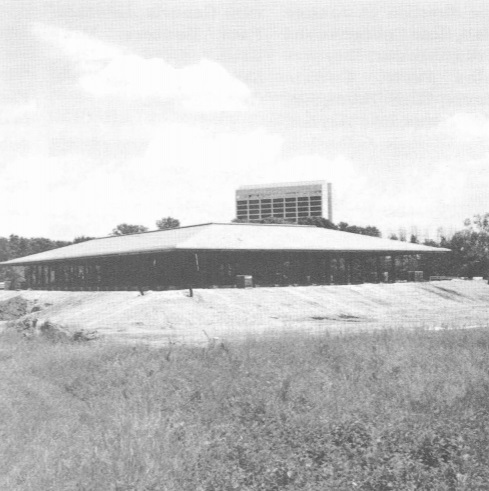Progress Continues on Education Center - Resource Center and Programs to be Housed in the Science Education Center

A wooded setting and a view of the interpretive prairie trail enhances the prairie-style architecture of the Science Education Center.
The fascinating world of quarks and quasars will soon be explored at the Fermilab Science Education Center. With its opening planned for early 1992, the Center will become home to the innovative and highly popular science education programs co-sponsored by Fermilab and Friends of Fermilab.
Each year thousands of teachers and students participate in the many workshops, field trips and classes presented at Fermilab. Aimed at enhancing the quality of science and mathematics education at the precollege level, these programs serve students from preschool to high school and their teachers. The new facility, which will include science classrooms and a specialized library for teachers, will make it possible to increase the number of schools served by the science and mathematics programs at Fermilab.
The Center is a collaborative effort between Fermilab and the education community. School districts are members of the Program Advisory Group which plays an important role in determining the programs offered through the Center.
When complete the Center will house the Teacher Resource Center (TRC) and both the formal and informal programs. Fermilab offers 40 precollege education programs developed over the past ten years.
The Teacher Resource Center is a clearinghouse for ideas, materials and resources. As a provider of materials and services to interested librarians and science educators, the TRC is the hub of a science education network in DuPage and Kane Counties. The resources available at the TRC help teachers make their classrooms more stimulating learning environments for students.
The formal programs include teacher enhancement workshops and institutes, opportunities for research participation, development and distribution of instructional materials, Laboratory tours, special events, science shows and a variety of outreach activities. The overall goals of the precollege programs are to enhance the quality of science and mathematics education, to encourage all young people to be scientifically literate and to encourage motivated students to pursue careers in science, engineering and technology. Special emphasis is given to participation by members of underrepresented groups.
Informal science includes hands-on science that encourages creative investigation and thoughtful questioning that leads to a real understanding of science and its applications and implications. Interactive teaching stations, environmental activities, audio-visual materials, computers and a science playground will all be part of the Center's informal science offerings. The interactive teaching stations, Quarks to Quasars, are being developed in five areas: accelerators, detectors, scattering experiments, the structure of matter and the structure of the Universe. The science lab will include table top interactive displays in many areas of science and mathematics related to the school curriculum. A year round program including special events, summer camps and classes for children and/or their parents as well as a lecture series for adults will be part of the informal offerings of the Science Education Center.


